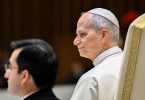
A protester holds a sticker and roses during an April 10 demonstration against the death penalty in Taipei, Taiwan. Pope Francis urged additional support in abolishing the death penalty worldwide and eradicating the external debt of developing countries. (CNS photo/Ritchie B. Tongo, EPA)
by Carol Glatz
VATICAN CITY (CNS) — Pope Francis urged additional support in abolishing the death penalty worldwide and eradicating the external debt of developing countries.
Working to build dialogue, peace and justice in “our complex and violent world” is a huge and difficult task that requires seeking the common good, he said in a written message to participants at a conference in Rome.
Dialogue, he said, requires “being ready to give and also to receive, to begin not with the assumption that the other is wrong, but to begin with our differences, to seek — without negotiating — the good of all, and in the end having found an agreement, to firmly stick to it.”
The pope’s message was addressed to Cardinal Peter Turkson, president of the Pontifical Council for Justice and Peace. The council, Pax Christi International and other Catholic organizations were hosting a conference April 11-13 to discuss the Catholic understanding of nonviolence and just peace. The cardinal read the pope’s message to participants April 11.
The pope asked those taking part in the conference to help support his appeal to world leaders during this Year of Mercy for a moratorium and end to the death penalty everywhere it is still in force. He also called for “the cancellation or the sustainable management of the international debt of poorer nations.”
He encouraged the renewal “of the active witness of nonviolence as a ‘weapon’ to achieve peace.” Choosing the path of nonviolence, he said, is a “daunting” task as is “reaching people’s very souls” through compassion and dialogue, building bridges and fighting fear.
Theologians, church leaders and peacebuilding experts attending the conference also discussed the rejection of a “just war” mentality in favor of alternative conflict resolutions based on nonviolence and justice.
“The media, and public opinion influenced by the media, convey an incorrect interpretation of the religious concept of just war,” Cardinal Turkson said in his talk April 11.
The church’s stance has evolved over time, he said, achieving “a progressive transformation of consciences” with the aim of ultimately showing that violence is not the only way to end conflict.
When St. Augustine and St. Thomas Aquinas developed the concept of “just war,” he said, “its fuller treatment arose when Europe was governed by barbarian peoples for whom the only thing that counted was violence.”
The church at the time was seen as “a civilizing power because of its religious nature” and, therefore, it sought to influence leaders by continually restricting the conditions that would justify their use of force, he said.
However, with secularization, leaders in Western nations began to claim for themselves “the right to decide whether or not [a] recourse to war was just” rather than look to the church for moral guidance and a proper interpretation of God’s law, the cardinal said.
Cardinal Turkson said Pope Francis offers a “nuanced” guide for distinguishing “just” versus “unjust” war.
In response to a reporter’s question in 2014 about terrorist threats from the so-called “Islamic State” organization, the pope had said it was acceptable to stop an unjust aggressor. However, stopping aggression, he said, doesn’t mean “drop bombs, make war.”
“How many times, with this excuse of stopping an unjust aggressor, the powers have taken over peoples and carried on an actual war of conquest,” the pope said.
One nation must never determine by itself how to stop the aggressor, he said, as different sides should evaluate the best means to use.






